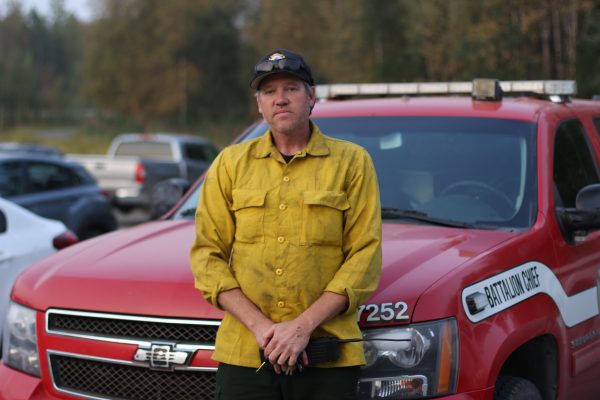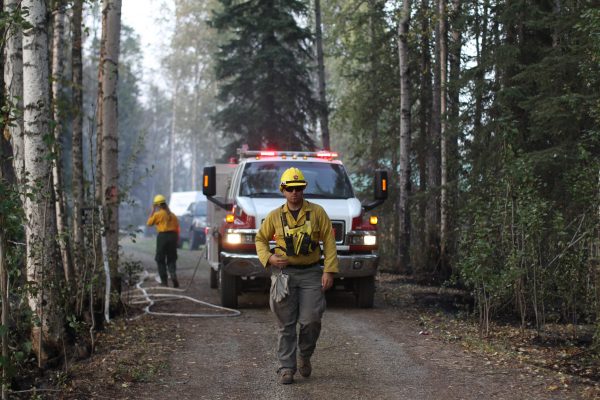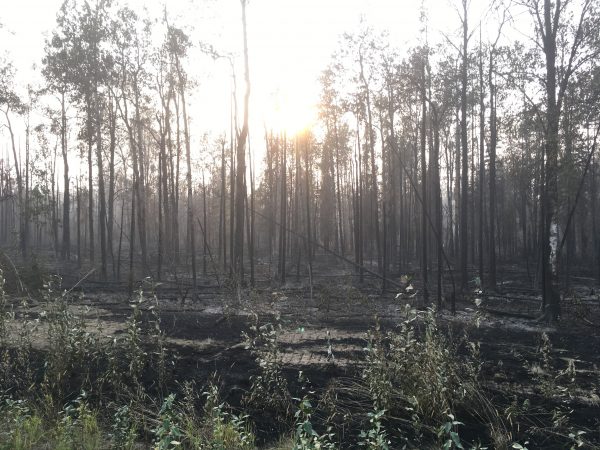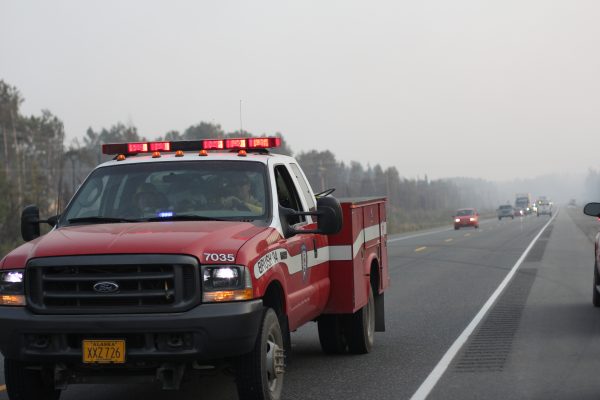
Dozens of wildland firefighters have arrived from the Lower 48 this week to fight the McKinley fire south of Talkeetna. But for the first two days, it was largely local crews responding to the fire, many who drove up to the Mat-Su on short notice.
Mike Davidson was one of them. He’s a battalion chief with the Anchorage Fire Department, and on Saturday afternoon, he got a phone call.
State wildfire managers were on the other end of the line, and they were asking for help — immediately.
“They asked us to respond as quickly as possible, and I think we left Anchorage within less than an hour of receiving that phone call,” Davidson said Tuesday, as he drove a reporter through the fire area.
The McKinley fire was still threatening more than 1,000 buildings Wednesday, and it has forced evacuations of up to 400 people, according to new figures released by officials.
When the fire started, Anchorage wasn’t the only department asked to help. Firefighters from the Mat-Su, Joint Base Elmendorf-Richardson and Chugiak, among others, also started driving toward the fire Saturday — some of them on such short notice that they had to go without underwear or a toothbrush.
In the first two frenetic days of the fire, as stiff winds fueled its growth, the municipal crews fought it and teamed with state wildland firefighters to protect homes.
Many of the local firefighters are still at the scene, but their initial efforts were especially important, officials said, amid diminished staffing levels at the end of the fire season, and as other wildfires around the state were competing for staff and equipment.

In a report released Wednesday and first reported by the Anchorage Daily News, fire managers said the McKinley fire was human-caused. So are two other new wildfires burning in Southcentral Alaska, according to the report — the Deshka Landing fire, which is also in the Mat-Su, and the North Fork fire, near Homer.
By Wednesday, more than 250 firefighters had been assigned to the McKinley Fire, authorities said. Two Oregon wildland firefighting crews arrived Tuesday, along with a dozen engine crews from Fairbanks.

With the intense weekend winds now diminished, “the rate of spread we’re having with our fire right now is very slow,” public information officer Kale Casey said in a late Tuesday update.
“We are on the attack now, as opposed to being in a defensive, pull-firefighters-away mode,” he said.
But the first night of the McKinley fire, on Saturday, was all hands on deck. As an Anchorage battalion chief, it’s rare for Davidson to work directly on a fire line, but he said he was laying hose with his crew and going door to door to evacuate residents. On Tuesday evening, his yellow firefighting shirt was still smudged with soot.
That first night, Davidson got half an hour of sleep, between 5:30 a.m. and 6:00 a.m., in the driver’s seat of his SUV.
The crews at the fire had to pull long hours in part because of the scarcity of other wildland firefighters and equipment. Some summer firefighters had gone back to school, and the other wildfires around the state were competing for resources, said Greg Scully, an Alaska Division of Forestry official who helped supervise the initial response to the McKinley.
“One of our local crews was on a mandatory day off. Another crew was out in the woods in Copper River,” Scully said in a phone interview. “So, logistically, we didn’t have stuff staged so we could do a massive attack.”
The local firefighters had to weigh their desire to help against the risk posed by sending people away from their home areas, on a weekend with high fire danger.

“It’s a fine balance,” Davidson said. “What we chose to do was immediately deploy people because of the seriousness of what was occurring. But at the same time, we immediately called off-duty Anchorage firefighters in to backfill those absences.”
On Sunday, the second day of the McKinley fire, the firefighters on the scene knew reinforcements would be arriving soon. But they still had to get through one more day of intense wind.
By the early afternoon, the winds were so bad that they grounded a water tanker and two helicopters, Scully said. And the fire started moving so quickly that firefighters had to fall back.
“I had experienced firefighters comment that it was violent fire behavior, as it stood up, torched off quite a few trees at once, made a run towards them and then spotted over the highway,” Scully said.
The fire burned an estimated 50 structures that night, and another 30 afterward; authorities still haven’t said how many of those were houses.
Now that wildland crews have arrived from Outside, some of the local firefighters have returned home. But many were still on the fire lines Wednesday, and some departments sent up new crews.
John Della Croce, assistant chief at Chugiak Volunteer Fire and Rescue Company, said the assignment left him with mixed emotions.
“Deep sadness for the property loss, and people’s hopes and dreams,” he said. “But on the same side, Monday morning we see that the efforts of everybody up there left structures still standing. So, there’s great pride in that.”
Nathaniel Herz is an Anchorage-based journalist. He's been a reporter in Alaska for a decade, and is currently reporting for Alaska Public Media. Find more of his work by subscribing to his newsletter, Northern Journal, at natherz.substack.com. Reach him at natherz@gmail.com.




